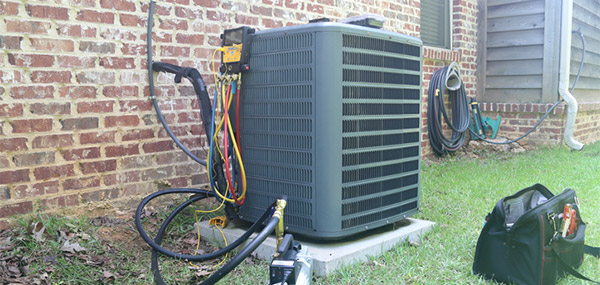
Preparing for HVAC Replacement
Originally posted on https://www.conditionedairsystems.com/preparing-for-hvac-replacement/
Whether you’re moving into a new house or experiencing the effects of a struggling heating or cooling system, you have likely considered the merits of HVAC replacement.
It is not something to be entered into lightly, in fact a residential HVAC replacement is very much a major project for any homeowner and should only be undertaken after serious thought.
First off, you must decide if complete HVAC replacement is the best option.
If your furnace is struggling but your air conditioner is chugging along – or the inverse is true, you may think of replacing just the one. But there are also arguments to be made for replacing the entire system at once.
3 QUESTIONS TO ANSWER BEFORE ANY HVAC REPLACEMENT
“HOW OLD IS MY HVAC SYSTEM?”
Air conditioners and heat pumps typically last 10-12 years, furnaces around 15-20. If both systems are in that age range, you can expect problems from each in the near future, no matter if one is working just fine at the moment.
“HOW EXPENSIVE WILL REPAIRS BE VS. THE COST OF REPLACEMENT?”
If repairs exceed half the cost of what it would cost to replace the unit, you should probably go ahead and just replace it. Don’t take our word for it. Consumer Reports made this same statement in 2014, and it stands as true today.
“HOW MUCH MONEY AM I LOSING IN UTILITIES?”
If your HVAC unit is struggling to heat or cool your house it will have to work harder to achieve what a fully-working system would achieve in less time. In other words, it is constantly running and thus pulling more power – which costs you more money from your power company.
Once you have answered those questions and determined that HVAC replacement is the way to go then you need to begin the process of determining the right unit and the best company to install it.
4 TIPS TO ENSURE A SUCCESSFUL HVAC REPLACEMENT EXPERIENCE
CALCULATE THE CORRECT HVAC SYSTEM SIZE.
How big should your new unit be to establish the proper level of comfort? This is obviously a question for your contractor, but there is a way to determine, in general, the size needed.
First, determine the square footage of your house. Next, determine the base BTU (the unit used to measure energy used for heating and cooling, the British Thermal Unit). It takes approximately 25 BTUs to cool one square foot of your home. Also, be sure to account for high ceilings. If they are over eight feet high increase your BTU estimates by 25 percent.
For example, a 1,500-foot square foot house with normal ceiling height would require 37,500 BTUs to cool properly. To determine the size of air conditioner necessary, divide that 37,500 by 12,000 (whatever the number of square footage and BTUs always divide by 12,000). The result is roughly equal to 3, meaning you would need a 3-ton air conditioning unit.
Do your research. Check to see which units are certified by Energy Star so that they work at maximum efficiency. Also, familiarize yourself with these two acronyms: HSPF and SEER.
HSPF stands for Heating Season Performance Factor. It determines the efficiency of a heat pump. All new heat pumps must have a minimum rating of 7.7
SEER stands for Seasonal Energy Efficiency Ratio, which rates the efficiency of a cooling system. All new systems must rate a minimum of 14.
The higher the rating of each unit, the more efficient it will be. Higher numbers also incur higher costs, though better efficiency will cost you less in power bills over the long run.
GET MULTIPLE QUOTES.
There are plenty of companies out there that both install and maintain HVAC systems. But each is a little different and will likely offer competing prices. As long as you live somewhere where there are a multitude of competitors it is a good idea to get as many quotes as possible. Ensure that the company you contact is state licensed (you can check any company or employee here via this Georgia state website), insured and bonded.
Each company should take measurements and inspect your current system. They should also provide you with a written and signed estimate of the replacement fee and process. The estimate should include job start and completion date, the details of the entire job (including any ductwork or construction costs incurred), price for each task, the details of the new system, clean-up costs, removal of old HVAC unit and new system warranty details. You should make sure that any installation company has proof of a current HVAC license and insurance. We at Conditioned Air Systems give free replacement quotes free second opinions on quotes gathered from other HVAC companies.
PREPARE FOR THE REPLACEMENT.
Once you choose the right installation contractor and system, make sure the work space the contractor will use is free and clear of furniture or anything else that could get in the way. As the installation will likely kick up and swirl dust around, use plastic/cloth sheets to cover up any heavier furniture items near the installation that cannot be moved easily. You’ll also want to make sure your contractor protects any nearby flooring with drop cloths.
BE READY FOR POSSIBLE SNAGS.
If you’ve ever had any contract work done on your house, you likely know that problems can pop up. Installing a new HVAC system is no different. So, no matter how much you are quoted for a new installation, it is imperative that you budget more for the project just in case something unexpected occurs – such as the need to replace ductwork, rotten wall studs or necessary electrical upgrades that may have escaped the initial survey and quote.
